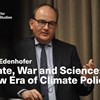quo
Stable and unstable choices
Economics and Philosophy, DOI:10.1017/S0266267119000026 Abstract This paper introduces a condition for rational choice that states that accepting decision methods and normative theories that sometimes en
Limited and Mixed Evidence for System-Sanctioned Change to Protect the Environment: A Replication Study
International review of social psychology, vol 37:1 Abstract Feygina and colleagues (2010, Study 3) reported that people who prefer the status quo can be encouraged towards pro-environmental responses w

Ottmar Edenhofer: A New Era of Climate Policy
Research seminar with Ottmar Edenhofer, who is Director and Chief Economist of the Potsdam Institute for Climate Impact Research as well as Director of the Mercator Research Institute on Global Common
Ottmar Edenhofer: Climate, War and Science. Practical Dilemmas, Theoretical Challenges and a New Era of Climate Policy
Venue: Institutet för framtidsstudier, Holländargatan 13 , 4th floor in Stockholm, and online REGISTER >Research seminar with Ottmar Edenhofer, who is Director and Chief Economist of the Potsdam InstAbstractStarting by stating the current status quo of climate change, the talk focuses on the practical dilemmas an ambitious climate policy is facing, also on the grounds of the theoretical challenges involved. The present geopolitical global situation is calling for a new era of climate policy. But how do we get there?
Lukas H. Meyer: Fairness is most relevant for country shares of the remaining carbon budget
Lukas H. Meyer, Professor of Philosophy at the University of Graz, Austria, and Speaker of the Field of Excellence Climate Change Graz, the Doctoral Programme Climate Change, and the Working Unit MoraIn my talk I argue that fairness concerns are decisive for eventual cumulative emission allocations shown in terms of quantified national shares.I will show that major fairness concerns are quantitatively critical for the allocation of the global carbon budget across countries. The budget is limited by the aim of staying well below 2°C. Minimal fairness requirements include securing basic needs, attributing historical responsibility for past emissions, accounting for benefits from past emissions, and not exceeding countries’ societally feasible emission reduction rate. The argument in favor of taking into account these fairness concerns reflects a critique of both simple equality and staged approaches, the former demanding the equal-per-capita distribution from now on, the latter preserving the inequality of the status-quo levels of emissions for the transformation period. I argue that the overall most plausible approach is a four-fold qualified version of the equal-per-capita view that incorporates the legitimate reasons for grandfathering.
Political Philosophy Mini-Workshop
This is an open event with pre-circulated papers, including a presentation of the first paper but not the second. See abstracts below. Schedule 13.15 Coffee 13.30 “Legitimate Authority and Social OntologAuthor: Laura Valentini, LSECommentator: Aaron Maltais, Stockholm University
Mark Jaccard: Economic Efficiency vs Political Acceptability Trade-offs in GHG-reduction Policies
Mark Jaccard, Professor in the School of Resource and Environmental Management at Simon Fraser University, VancouverAbstractThere are obvious reasons why for three decades most jurisdictions have failPublic surveys and observation of real-world GHG reduction successes suggest that explicit carbon pricing (carbon tax and perhaps cap-and-trade) can be substantially more politically difficult than certain regulatory policies for shifting the energy system on to a deep decarbonization trajectory. Nonetheless, some people have argued that carbon pricing is an essential GHG reduction policy, suggesting that sincere politicians must do carbon pricing no matter how politically difficult. But the claim that carbon pricing is essential is factually incorrect. Deep decarbonization can be achieved entirely with regulations. Regulatory policies are unlikely to be as economically efficient as carbon pricing. But not all regulations perform identically when it comes to the economic-efficiency criterion. Flexible regulations have some attributes that make them low cost relative to regulations that require adoption of specific technologies.This talk provides evidence that assesses both the relative economic efficiency of policies and their relative political acceptability. The findings reported here suggest that some kinds of flexible regulations can perform significantly better than explicit carbon pricing in terms of relative political cost per tonne reduced while performing only marginally worse in terms of economic cost per tonne reduced. Presumably, this type of trade-off information could be of value to politicians who sincerely want deep decarbonization but would also like to be rewarded with re-election so that they and competing politicians see the value in ambitious and sustained GHG reduction efforts.








